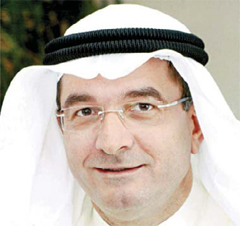 Abdul-Majid Al-Shatti
Abdul-Majid Al-ShattiKUWAIT: The recent decision by the Central Bank of Kuwait (CBK) to raise the interest rate on the Kuwaiti dinar by a quarter percentage point to 2.50 percent from 2.25 percent, was much expected and will enhance the currency's competitiveness, and lure as a saving pot, bankers have agreed.
In separate interviews with KUNA, they ruled out any negative impact on the national economy following the rise of the discount rate on the dinar. The decision was taken after continuous monitoring by the CBK of the local economic, monetary and financial conditions, Executive Director of the CBK's Supervision Sector Waleed Al-Awadhi told KUNA.
He added that the raising of the discount rate was part of the CBK's keenness on guaranteeing the competitiveness and attraction of the dinar as a saving pot, besides further consolidating monetary and financial stability, as well as providing the various economic sectors with sources of financing. Referring to the consuming loans, usually for a five-year term, Al-Awadhi said the interest rate on them is fixed, and not liable to be altered, even if conditions are most likely to change in the future.
The interest rates on borrowers before the raise decision took effect as one December 15, will remain unchanged, Al-Awadhi stressed. As for the long-term loans, 15 years, he pointed to the CBK's 2008 relevant decisions, which provided for a fixed interest for five years. Then, the bank has the right to review the rate so as to cope with developments of the interest rate. But the rate will see a maximum change of two percent, up or down, the CBK official said.
On his part, Board Chairman of the Commercial Bank of Kuwait Ali Al-Mousa, ruled out any negative effect on the national economy after the discount rate decision. The decision is one of the tools of the central bank to regulate liquidity on the market, and monetary stability in general, he said.
Al-Mousa pointed to the CBK's objectivity and visionary that have been recognized by international institutions. It's always been the case that raising the interest rate by a quarter percentage point does not at all affect the national economy, he noted.
Al-Mousa said that the lending system in Kuwait differs completely from that one applied in the US, for instance, where a similar step would put borrowers off, which does not happen here. Former head of the Kuwait Banking Association, and former board chairman of the Commercial Bank of Kuwait Abdul-Majid Al-Shatti said that the effect on the national economy would be very limited.
He added that the decision, taken in line with the legal and regulatory procedures of the central bank, was expected, coming the wake of a similar step in the US, which was much expected. - KUNA










